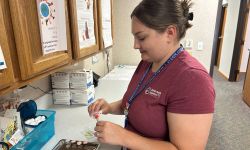Lifesaving doula services expanding for Michigan moms with help of Medicaid

- Doulas go through the pregnancy with families, giving informational and emotional — rather than medical — support
- Over 16,000 Medicaid recipients in Michigan have been reimbursed for doula services since 2023
- Henry Ford Health is expanding its doula program so the maternal guides are available to more parents
Every expectant parent should have access to a doula, Michigan’s maternal care experts say. But the parents who need those childbirth companions the most have historically had the least access.
It’s the sort of service that medical leaders believe could save lives in Detroit.
Doulas provide information and support to expectant patients that can prevent life-threatening complications. They don’t provide medical or clinical advice like a doctor or midwife, instead acting as an advocate for the patient in the delivery room. They may also help out during the first months of parenthood.

This story was produced through the New York & Michigan Solutions Journalism Collaborative, a partnership of news organizations and community groups dedicated to rigorous and compelling reporting about successful responses to social problems. The group is supported by the Solutions Journalism Network.
The collaborative’s Health Equity Solutions Project focuses on potential solutions to challenges in health care.
Recent Medicaid funding from the state and a precedent-setting program at Henry Ford Health are expanding access to doulas for women of color, said Dr. D’Angela Pitts, the hospital’s maternal infant health equity director.
“We have the highest maternal and infant mortality rates, two to three times higher,” Pitts said. “Having a doula — someone who looks like you that can advocate for you when you're not being heard — can decrease those adverse outcomes.”
A 2022 Detroit City Council report decried disparities in health care for women of color and recommended hospitals like Henry Ford establish doula programs. The report cited a Boston Medical Center study that found 75% of the inequity in maternal morbidity between Black and white patients was associated with hypertensive disorders of pregnancy.
Related:
- How a Michigan hospital is acting to save lives of Black pregnant women
- Women of color dying in childbirth is a crisis. Are doulas the answer?
And a 2017 World Health Organization report found that a doula’s presence during childbirth reduces a patient’s risk of death. “Continuous support during labor has often become the exception rather than the routine,” the report stated.
Today, the Detroit-based Henry Ford Health hospital — along with other Michigan care facilities — are making doulas more readily available after the recommendation from the city and an ongoing statewide initiative.
Key to the expansion is the state’s 2023 decision to cover doula services under Medicaid, a change encouraged by Detroit’s report.
The reimbursement of their services is a small but significant step toward health care equity for Michigan’s women of color, Pitts said.
Last year, Michigan Medicaid joined what is now 15 states in providing coverage for doula services. Michigan pays up to $1,150 per patient for six visits and attendance at birth.
According to Michigan Department of Health and Human Services official Chelsea Wuth, nearly 450 doulas have joined a new state registry since January 2023, about 60% of whom are Medicaid-enrolled.
The state has paid out over $5.1 million to help 16,124 patients afford their services.
With the wave of patients who could now be reimbursed, Henry Ford Health created the first hospital-based doula program in the country earlier this year, putting a team of seven doulas from the community on the payroll.

Patients may have had to pay thousands for the services of a doula in the past, Pitts said. Now, Medicaid members can receive their support for free or at a reduced cost.
During an expecting parent’s intake appointment at the hospital, their provider presents doulas alongside other maternal care options. Those include obstetricians and midwives who provide medical care during pregnancy and childbirth respectively.
“A doula is able to go through the pregnancy with you,” Pitts said.
Addressing needs, reducing stress
Doulas are important for women of color who may have become distrustful of the medical system after historical mistreatment, Pitts said. The American College of Obstetricians and Gynecologists argues that their services improve comfort and satisfaction during and after childbirth.
Henry Ford Health Doula Supervisor Alexis Grantham said a key role of her team is to support new parents and their babies in the home.
When Grantham comes out to meet a patient and their newborn, she starts with a broad question: “How would you like the visit to go?”
Patients may want help with breastfeeding, removing the umbilical cord or other unfamiliar tasks, she said. Other times, they just want a helping hand with giving their baby a bath, washing bottles and similar chores.
“It looks different for every patient,” she said, “the best thing that our doulas can do is ask families what it is they want or need within that postpartum visit.”
Those services were appreciated by Jasmine Reed, who gave birth in February with the assistance of a Henry Ford doula.
As a busy medical assistant, Reed had learned about the challenging nature of childbirth. Hours after first meeting her doula at the clinic, she realized she had already gone into labor.
Reed followed her doula’s advice in the hospital, occasionally getting up and moving around to relieve tension. Instead of giving birth on her back, she chose to lay on her side.
She delivered her daughter, Love, with little pain — and in only three hours.
“I wasn’t yelling, I wasn’t screaming,” Reed said. “The people outside my door didn’t even know I had my baby.”
During follow-up visits, Reed’s doula helped her breastfeed and relax.
On one occasion, she held Love while Reed took a nap. On another, she brought Reed groceries.
Love is now almost 6 months old, and Reed said she recommends doulas for others.
“Postpartum — mentally, and even physically with my newborn — it was a lot of help,” she said.

A step in the right direction
Henry Ford’s program is still growing and cannot provide doulas to everyone with Medicaid, Pitts said. Multiple factors determine patient eligibility, including at-home conditions and the observed need for external resources and support.
While Henry Ford’s doulas support patients at no cost, Medicaid reimbursement only funds part of their salary.
And it can be tricky to get fully reimbursed.
Caregivers in Michigan get $700 — over half of their potential maximum reimbursement — for attendance during childbirth.
Even with full reimbursement, Medicaid alone isn’t usually enough to cover doula services in Michigan, said Margarita Valbuena, Detroit’s Community Health and Social Services (CHASS) doula program manager.
Michigan is off to a great start with its program, she said, but it should pay upward of $3,000 per patient like the reimbursement rates in California and Washington.
In 2022, CHASS started its own program to hire a bilingual team of doulas. They are helping eliminate the language barrier for Spanish-speaking expectant parents, Valbuena said, giving them more control in their care.
“We try to empower our patients to ask questions when they're unsure about something,” she said.
Fatima Barba is part of CHASS’s team. After graduating from Michigan State University’s human development and family studies program, she received doula training to help new and expectant mothers in southwest Detroit.
In the first visits leading up to birth, Barba will tell a patient what they need to know for childbirth, including their right to informed consent for procedures, medical information about epidurals and signs of labor.
When the day comes, Barba will get a call or text from a patient or their emergency contact, often with the same message: “The baby is coming!”
Barba’s job in the delivery room is to provide physical rather than medical support, unlike doctors and nurses.
“For example, instead of having to take Tylenol, we try to encourage different forms of techniques that could be helpful,” she said.
Techniques may involve using breathing patterns, positions and equipment that can make the birth more comfortable, she said.
Her other key role is to provide support and translation when making medical decisions, including difficult ones that may put the patient or their child at risk.
“At the end of the day, it is their decision of what they want to continue with,” she said. “I’ll try to explain to them as the doctors and nurses do … just so they’re aware of the risks and benefits.”
Barba said she believes the difference she’s making in the lives of Michigan’s Hispanic patients will stay with her forever.
“Growing up in southwest Detroit and being able to help my same community, that's one of the biggest things that I wanted to do,” she said. “I'm just really grateful.”
See what new members are saying about why they donated to Bridge Michigan:
- “In order for this information to be accurate and unbiased it must be underwritten by its readers, not by special interests.” - Larry S.
- “Not many other media sources report on the topics Bridge does.” - Susan B.
- “Your journalism is outstanding and rare these days.” - Mark S.
If you want to ensure the future of nonpartisan, nonprofit Michigan journalism, please become a member today. You, too, will be asked why you donated and maybe we'll feature your quote next time!








